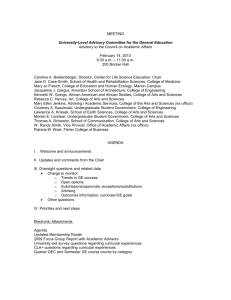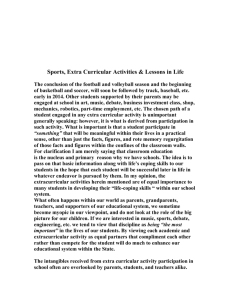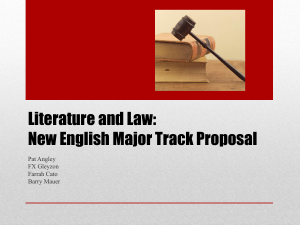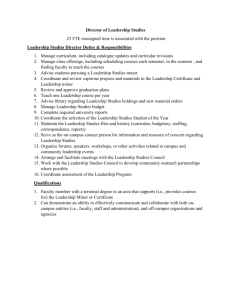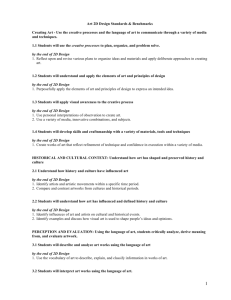Spring 2013 KNR 419 CONTEMPORARY CURRICULUMS IN
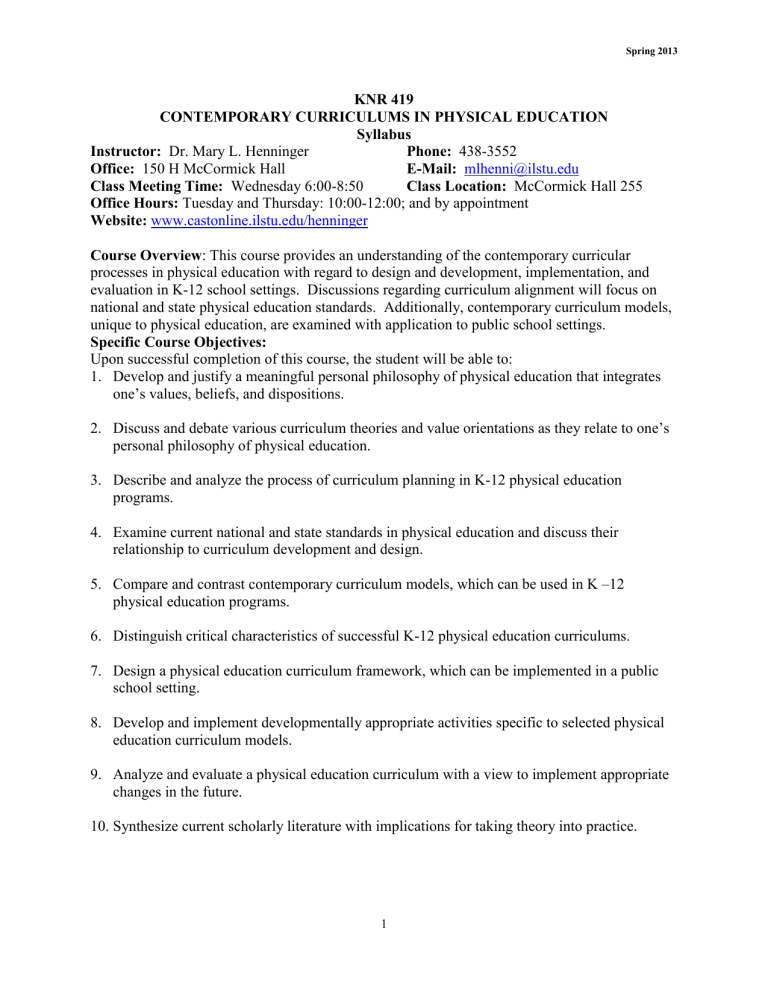
Spring 2013
KNR 419
CONTEMPORARY CURRICULUMS IN PHYSICAL EDUCATION
Syllabus
Instructor: Dr. Mary L. Henninger
Office: 150 H McCormick Hall
Phone: 438-3552
E-Mail: mlhenni@ilstu.edu
Class Meeting Time: Wednesday 6:00-8:50 Class Location: McCormick Hall 255
Office Hours: Tuesday and Thursday: 10:00-12:00; and by appointment
Website: www.castonline.ilstu.edu/henninger
Course Overview : This course provides an understanding of the contemporary curricular processes in physical education with regard to design and development, implementation, and evaluation in K-12 school settings. Discussions regarding curriculum alignment will focus on national and state physical education standards. Additionally, contemporary curriculum models, unique to physical education, are examined with application to public school settings.
Specific Course Objectives:
Upon successful completion of this course, the student will be able to:
1.
Develop and justify a meaningful personal philosophy of physical education that integrates one’s values, beliefs, and dispositions.
2.
Discuss and debate various curriculum theories and value orientations as they relate to one’s personal philosophy of physical education.
3.
Describe and analyze the process of curriculum planning in K-12 physical education programs.
4.
Examine current national and state standards in physical education and discuss their relationship to curriculum development and design.
5.
Compare and contrast contemporary curriculum models, which can be used in K –12 physical education programs.
6.
Distinguish critical characteristics of successful K-12 physical education curriculums.
7.
Design a physical education curriculum framework, which can be implemented in a public school setting.
8.
Develop and implement developmentally appropriate activities specific to selected physical education curriculum models.
9.
Analyze and evaluate a physical education curriculum with a view to implement appropriate changes in the future.
10.
Synthesize current scholarly literature with implications for taking theory into practice.
1
Spring 2013
Topical Outline:
I. Overview of curriculum
A.
Definition of curriculum
B.
Curriculum theories
C.
Value orientations/Philosophical basis
II. Physical education standards
A.
National standards
B.
Illinois state learning standards
C.
Alignment of standards to the physical education program
III.
Curriculum planning
A.
Understanding the school setting
B.
Identifying environmental factors
C.
Addressing student needs and interests
D.
Establishing program goals and objectives
E.
Developing scope and sequence of activities
F.
Assessing the curriculum
IV.
Overview of various physical education curriculum models
A.
Sport education
B.
Fitness education
C.
Tactical games
D.
Movement analysis
E.
Social responsibility
F.
Adventure education
V.
Program evaluation
A.
Purposes of curriculum evaluation
B.
Role of quantitative and qualitative evaluation
C.
Process of curriculum evaluation
Required Texts:
National Association for Sport & Physical Education. (1995). Moving Into the Future National
Standards for Physical Education: A Guide to Content and Assessment . St. Louis, MO:
Mosby.
2
Spring 2013
Required Student Tasks and Assignments:
1.
Homework assignments and class participation.
2.
Five critiques of articles regarding physical education curriculum from scholarly journals, with a minimum of two articles being data-based research.
3.
Philosophy of teaching paper.
4.
A physical education curriculum plan which could be implemented within a school setting, and presentation of the framework in class.
5.
Presentation of selected physical education curriculum model and appropriate activities specific to those models.
6.
PECAT Program Assessment
Student Evaluation Devices:
1. Five article critiques
4. Curricular Plan Development
2. Philosophy paper
3. PCAT Program Assessment & Presentation
5. Curricular Planning Presentations
6. Curricular Model Implementation & Presentation
Grading Scale:
90 - 100%
80 - 89%
70 - 79%
60 - 69%
59% and below
A
B
C
D
F
15%
15%
15%
20%
15%
20%
3
Spring 2013
Tentative Course Schedule
All assignments are due the day they appear in the outline
THEME 1: Philosophy, Standards, and Programmatic Needs
January 16, 2013: Introduction to Course
Physical education standards
A.
National standards
B.
Illinois state learning standards
C.
Alignment of standards to the physical education program
D.
Definition of curriculum
January 23, 2013: Curriculum Design
(Readings: Curtner-Smith, 1999; Ennis, 1992; Siedentop, 1994)
Overview of curriculum
A.
Definition of curriculum
B.
Curriculum theories
C.
Value orientations/Philosophical basis
PECAT Download from http://www.cdc.gov/healthyyouth/pecat/index.htm
January 30, 2013: PCAT Program Assessments
(Readings: Chapters 4 & 5 from Jewett, Bain, & Ennis, 1995 that I will email to you; Begin PCAT data gathering)
A.
Understanding the school setting
B.
Identifying environmental factors
C.
Addressing student needs and interests
D.
Establishing program goals and objectives
E.
Developing scope and sequence of activities
F.
Assessing the curriculum
February 13, 2013 PCAT Program Evaluation Presentations
THEME 2: Curricular Models: Design and Implementation
February 27, 2013: Sport Education
March 6, 2013: Teaching Games for Understanding
March 20, 2013: Social Responsibility
March 27, 2013: Adventure Education
April 3, 2013: Curricular Development with a Curricular Model
April 17, 2013: Curricular Development with a Curricular Model
April 24, 2013: Results of Pilot Curricular Model Implementation
4
May 1, 2013: Program evaluation
A.
Purposes of curriculum evaluation
B.
Role of quantitative and qualitative evaluation
C.
Process of curriculum evaluation
Spring 2013
5
